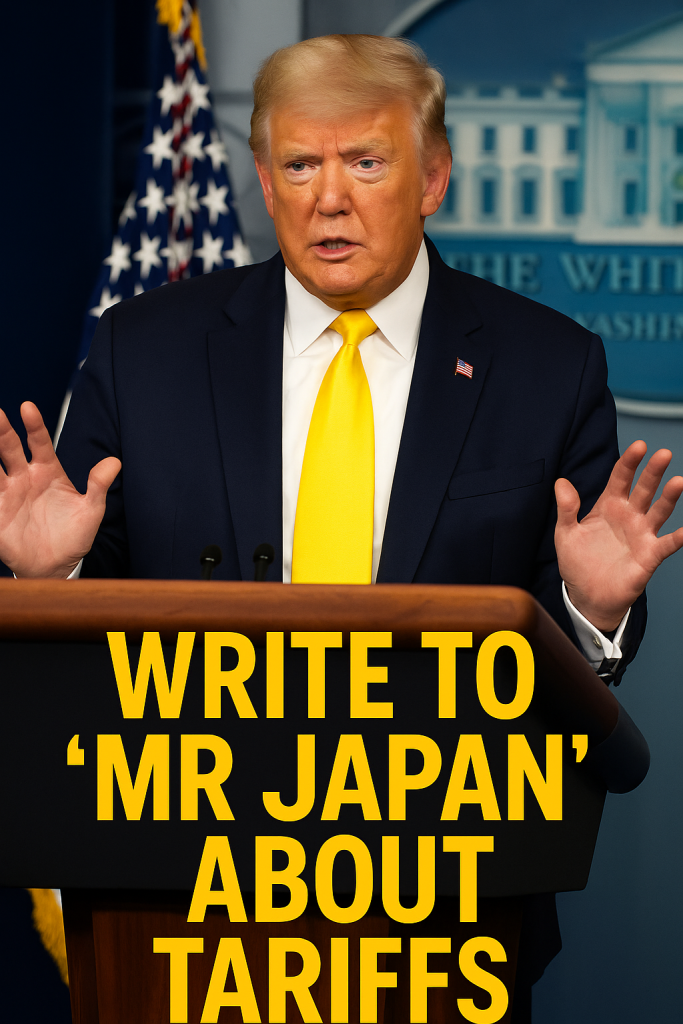Former President Donald Trump found himself at the center of a fresh wave of ridicule after he publicly stated that he planned to write a letter to “Mr Japan” regarding trade tariffs. The comment, made during a recent campaign event, quickly went viral on social media, drawing criticism and jokes about his apparent unfamiliarity with formal diplomatic protocols and the nuances of international relations.
In a statement aimed at addressing U.S.-Japan trade relations, Trump said he intended to personally reach out to “Mr Japan” to discuss the need for Japan to reduce tariffs on American goods. The remark, which seemed to casually address the entire Japanese government or perhaps its leader as a singular entity, was perceived as overly simplistic and out of touch by commentators and observers around the world.
The reaction was swift and scathing. Many on social platforms poked fun at Trump’s phrasing, noting that the correct diplomatic approach typically involves directed, formal communications to the Prime Minister of Japan or appropriate trade officials, not vague references to “Mr Japan.” Critics pointed out that such remarks may depict a lack of seriousness about the intricate nature of international trade negotiations.
Trade experts weighed in to underscore the complexity of tariff discussions, which involve multilateral cooperation, bilateral agreements, and often months of negotiation between government officials. Japan, one of America’s largest trading partners, maintains a strategic alliance with the United States, and discussions about tariffs are typically handled through careful, formal channels.
“It’s not as simple as just writing a letter to ‘Mr Japan,’” one analyst commented. “Trade policies involve a web of diplomatic factors, negotiations, and economic strategies. Public statements like this can undermine perceived diplomatic competence.”
This event comes amid renewed discussions over trade policies and tariffs as the U.S. and Japan navigate economic challenges in 2024. Japan has maintained certain tariffs on American agricultural products and manufactured goods, issues that have often been points of tension in bilateral trade relations. While Trump’s intention to address tariffs aligns with a broader political objective of bolstering U.S. economic interests abroad, the informal manner in which he conveyed the message drew significant criticism.
Furthermore, political opponents seized on the incident to question Trump’s grasp of foreign policy. Some interpreted the comment as emblematic of a tendency to oversimplify complex issues for political convenience. Supporters, conversely, defended the former president’s focus on protecting American workers, emphasizing his direct style of communication.
Japan’s government, for its part, has not issued any official response to Trump’s “Mr Japan” comment. Diplomats traditionally respond through well-established diplomatic channels rather than on social media or public soundbites, which means the remark is unlikely to have any substantial impact on ongoing trade discussions.
Despite the ridicule, Trump’s statement continues to be widely shared and discussed, highlighting the power of social media to amplify even casual remarks made by political figures. The episode serves as a reminder of the heightened scrutiny public officials face in the digital age and the importance of precise language when addressing international audiences.
As the 2024 campaign season intensifies, observers can expect more moments like this, where political rhetoric intersects with global diplomacy, often generating viral moments that shape public perception as much as policy.



